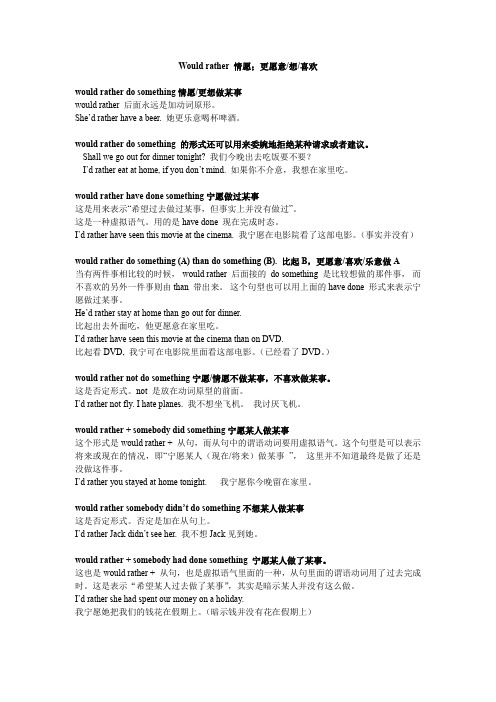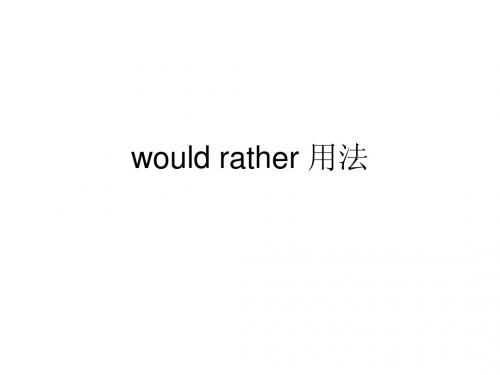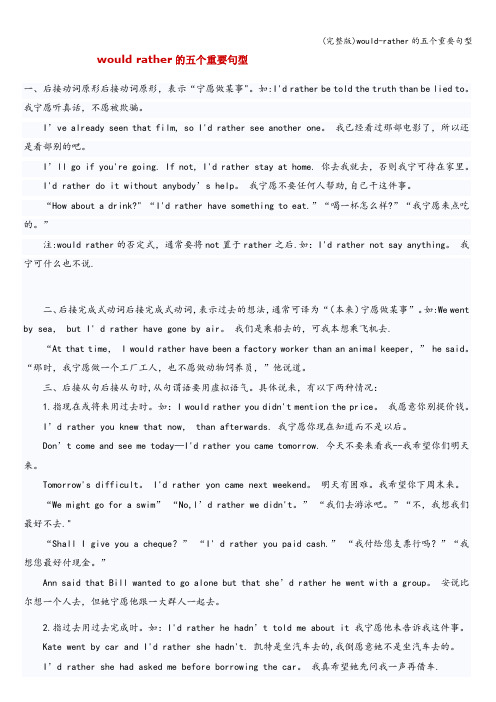would rather 用法归纳
would rather 用法归纳

would rather 用法归纳“would rather+动词本相”是英语中罕有的一个习用句式.would在此决无“曩昔”之意,且无词性.时态变更.该句式经常应用来暗示选择的意愿,意谓“宁可……”.“情愿……”.例如:(1) He would rather work in the countryside.她宁可到农村去工作.(2) If you would rather be alone, we’ll all leave here.假如你情愿独自呆着,那我们都分开这儿.would rather与than连用,可组成另一个习用句式,即:“would rather...than....”,意谓“宁可(愿)……(而)不要(愿)……”.“与其……不如……”.用以表达主语的意愿,强调经由选择后做个中一件事,而不肯做另一件事.例如:(4) I would rather watch TV at home than go to the cinema.我宁可在家看电视而不肯去看片子.(5) The children would rather walk there than take a bus.孩子们情愿步行去那边而不乘公共汽车.在应用“would rather...than...”句型时,应留意以下几点:1. than后边也应接动词本相(见句(4)和(5)),但如该句型前后衔接的两个动词雷同,则 than之后的谁人动词可省去.如:(6) I’d rather you know that now than (know) afterwards.我宁可你如今就知道这件事,而不是今后.3.有时,为暗示语气上的强调,可将rather than置于句首,如:(7) Rather than refuse to help you, I would borrow money from my friends.试比较I would borrow money from my friends rather than refuse to help you.我宁可向同伙借钱,也不肯谢绝帮忙你.4. would rather后还可接动词的完成式,暗示主语要做某事,而成果事与愿违的意思.如:(8) I would rather have left a note on her desk.我本想留张字条在她书桌上的.(事实上没有留)试比较(9) I’d rather I left a note on her desk.我宁可留张字条在她的书桌上.。
Would rather 用法小结

Would rather 用法小结文/郭李强一、would rather意思是“宁愿、宁可、更、最好、还是为好”,后接动词原形,常省略为’d rather,表示优先选择的一种方式其否定形式是would rather not do sth. would rather没有人称和数的变化,所有的人称一律用would rather.“would rather+动词原形”是英语中常见的一个惯用句式,美国英语中多用had rather。
would (had)在此决无“过去”之意,它是一个情态助动词,且无词性、时态变化。
例:Mr. Li would rather not listen to rock music. 李先生不愿意听摇滚音乐。
Sh e’d rather work in the countryside. 她宁可到农村去工作。
二、如果在两者中进行取舍,表示“宁愿……而不愿……,与其……宁可……”的意思时,则可用would rather…than…或would…rather than…的句型例: I would rather watch TV at home than go to the cinema.我宁可在家看电视而不愿去看电影。
请注意:1) would rather…than…/would…rather than…也可以颠倒为:rather than…would…。
Would(rather)和than后都接不带to的动词不定式,若选用的动词相同,那么than 后的动词可以省略。
例:He would rather drink tea than coffee.他喜欢喝茶而不喜欢咖啡。
Rather than work in such bad condition, he would give up. 与其在这样差的条件下工作,他宁愿放弃。
2)使用would rather…than…句型时要注意“平行结构”,即在than 的前后要用两个同类的词或词组,如两个名词、两个不定式、两个介词短语等。
Would rather 用法

Would rather 情愿;更愿意/想/喜欢would rather do something情愿/更想做某事would rather 后面永远是加动词原形。
She’d rather have a beer.她更乐意喝杯啤酒。
would rather do something 的形式还可以用来委婉地拒绝某种请求或者建议。
-- Shall we go out for dinner tonight? 我们今晚出去吃饭要不要?-- I’d rather eat at home, if you don’t mind.如果你不介意,我想在家里吃。
would rather have done something宁愿做过某事这是用来表示“希望过去做过某事,但事实上并没有做过”。
这是一种虚拟语气。
用的是have done 现在完成时态。
I’d rather have seen this movie at the cinema.我宁愿在电影院看了这部电影。
(事实并没有)would rather do something (A) than do something (B). 比起B,更愿意/喜欢/乐意做A当有两件事相比较的时候,would rather 后面接的do something 是比较想做的那件事,而不喜欢的另外一件事则由than 带出来。
这个句型也可以用上面的have done 形式来表示宁愿做过某事。
He’d rather stay at home than go out for dinner.比起出去外面吃,他更愿意在家里吃。
I’d rather have seen this movie at the cinema than on DVD.比起看DVD, 我宁可在电影院里面看这部电影。
(已经看了DVD。
)would rather not do something宁愿/情愿不做某事,不喜欢做某事。
这是否定形式。
英语中 would rather 的用法

在英语中,would rather 常用来表达偏好,相当于 would prefer,通常表达偏好的人是句子的主语,但是有的时候偏好的人不是句中的主语,那么动作到底是谁发出的呢?这需要从 would rather 的两种不同的结构讲起。
一、would rather1. 肯定句在肯定句中,would rather 常缩略为 'd rather ,结构是:主语 + would rather + 不带 to 不定式,此时句中的动作是主语要发出或已发出的,例如:Peter'd rather spend time on the beach.彼得宁愿花时间在海滩上。
I would rather learn a new language than study math.我宁愿学一门新语言也不愿学数学。
She would rather have spent the money on a holiday.她宁愿把钱花在度假上。
解析:此句意思是 The money wasn’t spent on a holiday.2. 疑问句在疑问句中,结构是 would + 主语 + rather + 不带 to 不定式,此时句中的动作是主语要发出的,例如:Would you rather stay at home?你宁愿呆在家里吗?Would they rather do homework tomorrow morning?他们宁愿明天早上做作业吗?3. 否定句在否定句中,结构是:would rather ('d rather) + not + 不带 to 不定式,此时句中的动作是主语要发出的,例如:She'd rather not go to class today.她宁愿今天不去上课。
I'd rather not dwell on the past.我不想再沉湎于过去了。
二、would rather … thanWould rather 常与 than 连用,用于在两个特定的动作中做出选择,此时句中的动作是主语要发出的或已发出的,would rather 和 than 后面接对等的成分,当前后动词一样时,可以省略后面的动词,例如:Would you rather eat dinner out than cook dinner tonight?今晚你宁愿在外面吃饭也不愿做饭吗?She would rather play tennis than go horseback riding.她宁愿打网球也不愿骑马。
would rather

• 希望某人现在/ 将会做某事, 暗含事实上是不可能的 • 如: • I would rather you were here now . • 我希望你现在在这里就好了. • I would rather you saw me off at the airport tomorrow . • 我但愿你明天来机场送我. see off
• 2.would rather have done sth. 当时宁愿做 了...,暗含对过去作过事情后悔了 • 如:I would rather have taken his advice at the meeting • 我宁愿当时在会上听取他的建议就好了。 • (事实上我并没有那么听取,暗含我现在后悔 了)
would rather 用法
• 1.would rather do A than do B= prefer to do A rather than do B • 表示宁愿去做A,而不愿去做B • 如: • I would rather fail than cheat in the examination. • 我宁愿考不及格,也不愿意考试作弊。
• 4.would rather sb. had done sth. 宁愿某人 做过某事, 表示与过去事实相反 • 如:I would rather he had told me about it. • 我宁愿你过去跟我说的是实话. • 暗含而事实上你并没有跟我说实话.
•
worth 的 用法
• 1. worth: be worth + n. 当名词为金钱时, 表示"…… 值得……" • be worth doing sth. "……某事值得被做" • The question is not worth discussing again and again. • This second-hand car is worth $2000 at the most. • The exhibition is worth a visit/visiting.
(完整版)would-rather的五个重要句型

would rather的五个重要句型一、后接动词原形后接动词原形,表示“宁愿做某事"。
如:I'd rather be told the truth than be lied to。
我宁愿听真话,不愿被欺骗。
I’ve already seen that film, so I'd rather see another one。
我已经看过那部电影了,所以还是看部别的吧。
I’ll go if you're going. If not, I'd rather stay at home. 你去我就去,否则我宁可待在家里。
I'd rather do it without anybody’s help。
我宁愿不要任何人帮助,自己干这件事。
“How about a drink?" “I'd rather have something to eat.”“喝一杯怎么样?”“我宁愿来点吃的。
”注:would rather的否定式,通常要将not置于rather之后.如:I'd rather not say anything。
我宁可什么也不说.二、后接完成式动词后接完成式动词,表示过去的想法,通常可译为“(本来)宁愿做某事”。
如:We went by sea, but I' d rather have gone by air。
我们是乘船去的,可我本想乘飞机去.“At that time, I would rather have been a factory worker than an animal keeper,” he said。
“那时,我宁愿做一个工厂工人,也不愿做动物饲养员,”他说道。
三、后接从句后接从句时,从句谓语要用虚拟语气。
具体说来,有以下两种情况:1.指现在或将来用过去时。
如:I would rather you didn't mention the price。
would rather 的五个重要句型
•
二、后接完成式动词, “(本来)宁愿做某事”
• We went by sea, but I’ d rather have gone by air.
• 是乘船去的,可我本想乘飞机去。
• “At that time, I would rather have been a factory
worker than an animal keeper,” he said.
2. 指过去用过去完成时。如:
• I’d rather he hadn’t told me about it 我宁愿他未告 诉我这件事。 • Kate went by car and I’d rather she hadn’t. 凯特是 坐汽车去的,我倒愿意她不是坐汽车去的。 • I’d rather she had asked me before borrowing the car. 我真希望她先问我一声再借车。 • 注:有时用于虚拟语气语境中。如: • If I’d lived in 1400, I’d rather have been a knight than a monk. 如果我生活在1400年,我宁愿当骑 士,不当修道士。 • If she’d had a chance, she’d rather have lived 100 years ago. 如果有机会她宁愿生活在100年前。
Thank you!
Good bye
一、后接动词原形“宁愿做某事”
• “How about a drink?” “I’d rather have something to eat.”“喝一杯怎么样?”“我宁愿来点吃的。”
• 注:would rather的否定式,通常要将not置于 rather之后。如: I’d rather not say anything. 我宁可什么也不说。
would-rather的五个重要句型
would rather的五个重要句型一、后接动词原形后接动词原形,表示“宁愿做某事”。
如:I'd rather be told the truth than be lied to. 我宁愿听真话,不愿被欺骗。
I've already seen that film, so I'd rather see another one. 我已经看过那部电影了,所以还是看部别的吧。
I'll go if you're going. If not, I'd rather stay at home. 你去我就去,否则我宁可待在家里。
I'd rather do it without anybody's help. 我宁愿不要任何人帮助,自己干这件事。
“How about a drink?” “I'd rather have something to eat.”“喝一杯怎么样?”“我宁愿来点吃的。
” 注:would rather的否定式,通常要将not置于rather之后。
如:I'd rather not say anything. 我宁可什么也不说。
二、后接完成式动词后接完成式动词,表示过去的想法,通常可译为“(本来)宁愿做某事”。
如:We went by sea, but I' d rather have gone by air. 我们是乘船去的,可我本想乘飞机去。
“At that time, I would rather have been a factory worker than an animal keeper,” he said. “那时,我宁愿做一个工厂工人,也不愿做动物饲养员,”他说道。
三、后接从句后接从句时,从句谓语要用虚拟语气。
具体说来,有以下两种情况: 1.指现在或将来用过去时。
如:I would rather you didn't mention the price. 我愿意你别提价钱。
英语重点词汇would rather句型详解
英语重点词汇would rather句型详解一、would rather不接从句用法(1)would rather do sth than do sth 宁愿做……而不愿做……(非虚拟语气)例:Liu Hulan would rather die than surrender before the enemy. 刘胡兰在敌人面前宁死不屈。
《汉英大词典》Kids would rather play than study孩子们宁愿玩也不愿学习。
《柯林斯高阶英汉双解学习词典》He would rather shoot himself than compromise his principles. 他宁愿一枪打死自己也不愿违背自己的原则。
《柯林斯高阶英汉双解学习词典》He himself believed in freedom, so much so that he would rather die than livewithout it.他非常崇尚自由,不自由,毋宁死。
《柯林斯高阶英汉双解学习词典》Most men would rather go to the grave than own up to feelings of dependency.大多数男人宁死都不愿承认有依赖感。
《柯林斯高阶英汉双解学习词典》She would rather perjure herself than admit to her sins.她宁愿在法庭上撒谎也不愿承认她的罪行。
《柯林斯高阶英汉双解学习词典》They would rather take the line of least resistance than become involved inarguments.他们倾向采用阻力最小的方案,不愿卷入纷争。
《柯林斯高阶英汉双解学习词典》I would rather pay for a meal than watch nine friends pick over and split a bill我宁可掏钱请客,也不愿看到9位朋友算来算去分摊账单。
wouldrather的详细用法
would rather有关would rather的五个重要句型一、后接动词原形后接动词原形,表示“宁愿做某事”。
如:I’d rather be told the truth than be lied to. 我宁愿听真话,不愿被欺骗。
I’ve already seen that film, so I’d rather see another one. 我已经看过那部电影了,所以还是看部别的吧。
I’ll go if you’re going. If not, I’d rather stay at home. 你去我就去,否则我宁可待在家里。
I’d rather do it without anybody’s help. 我宁愿不要任何人帮助,自己干这件事。
“How about a drink?” “I’d rather have something to eat.”“喝一杯怎么样?”“我宁愿来点吃的。
”注:would rather的否定式,通常要将not置于rather之后。
如:I’d rather not say anything. 我宁可什么也不说。
二、后接完成式动词后接完成式动词,表示过去的想法,通常可译为“(本来)宁愿做某事”。
如:We went by sea, but I’ d rather have gone by air. 我们是乘船去的,可我本想乘飞机去。
“At that time, I would rather have been a factory worker than an animal keeper,” he said. “那时,我宁愿做一个工厂工人,也不愿做动物饲养员,”他说道。
三、后接从句后接从句时,从句谓语要用虚拟语气。
具体说来,有以下两种情况:1. 指现在或将来用过去时。
如:I would rather you didn’t mention the price. 我愿意你别提价钱。
- 1、下载文档前请自行甄别文档内容的完整性,平台不提供额外的编辑、内容补充、找答案等附加服务。
- 2、"仅部分预览"的文档,不可在线预览部分如存在完整性等问题,可反馈申请退款(可完整预览的文档不适用该条件!)。
- 3、如文档侵犯您的权益,请联系客服反馈,我们会尽快为您处理(人工客服工作时间:9:00-18:30)。
would rather 用法归纳
“would rather+动词原形”是英语中常见的一个惯用句式。
would在此决无“过去”之意,且无词性、时态变化。
该句式常用来表示选择的意愿,意谓“宁可……”、“宁愿……”。
例如:
(1) He would rather work in the countryside.
她宁可到农村去工作。
(2) If you would rather be alone, we’ll all leave here.
如果你宁愿独自呆着,那我们都离开这儿。
would rather与than连用,可构成另一个惯用句式,即:“would rather...than....”,意谓“宁可(愿)……(而)不要(愿)……”、“与其……不如……”。
用以表达主语的意
愿,强调经过选择后做其中一件事,而不愿做另一件事。
例如:
(4) I would rather watch TV at home than go to the cinema.
我宁可在家看电视而不愿去看电影。
(5) The children would rather walk there than take a bus.
孩子们宁愿步行去那里而不乘公共汽车。
在使用“would rather...than...”句型时,应注意以下几点:
1. than后边也应接动词原形(见句(4)和(5)),但如该句型前后连接的两个动词相同,则than之后的那个动词可省去。
如:
(6) I’d rather you know that now than (know) afterwards.
我宁可你现在就知道这件事,而不是以后。
3.有时,为表示语气上的强调,可将rather than置于句首,如:
(7) Rather than refuse to help you, I would borrow money from my friends.
试比较
I would borrow money from my friends rather than refuse to help you.
我宁可向朋友借钱,也不愿拒绝帮助你。
4. would rather后还可接动词的完成式,表示主语要做某事,而结果事与愿违的意思。
如:
(8) I would rather have left a note on her desk.
我本想留张字条在她书桌上的。
(事实上没有留)
试比较
(9) I’d rather I left a note on her desk.
我宁可留张字条在她的书桌上。
